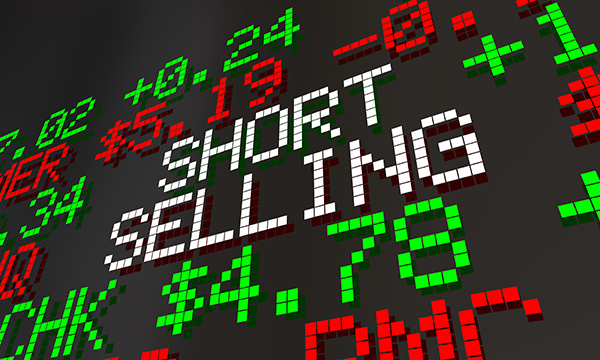Guest Post By: Baruch Silvermann of The Smart Investor.
Do you know about short selling?
It actually means that you’re selling something that you’re not even in possession of. When it comes to stocks this means selling a stock at a high price when you think that it’s going to end up dropping later. Then you can buy it again at the lower price.
With this type of investing you’re actually setting yourself up for a whole lot of risk because you’re trying to beat the market. If you purchase a stock you’re only out potentially the price of the stock or how much it decreases. For those who use short sale, however, you could be out a lot more.
Short Selling – How it All Works
Now, with this type of investing you’re going to be selling something that you haven’t actually purchased yet. So, what you’re trying to do is make a profit and that involves selling something for more than you think it’s going to be worth in the future so that you can potentially buy it back at that lower rate.
In order to buy things without having money, however, you’re going to borrow the stock or the money from whoever does own it and then you’re going to sell it to someone else. You would then have the pay the person the amount for the stock and you would need to pay some type of interest as well for the fact that you borrowed their stock without paying for it right away.
Keep in mind that you’re going to have to pay the amount of money that the stock is worth when you actually buy it and that could be more than what the stock sold for. That means you could end up losing money on the transaction and that’s where you’re going to have the higher risk.
If you sell short sell stocks you could lose a whole lot of money and far more than just the cost of the stock itself.
Why You Should Consider It?
So, why would you want to get involved in short sales if it’s that risky? There are a few different reasons.
Hedge Your Bets – Some people like to hedge their bets on other stocks through a short sale. So, if you are worried about losing your money you can open up a short position for your stocks. This helps you to keep the stock price that is already there at the time. You then don’t have to worry as much about dropping prices because you get an increase if that happens. If the stock rises you’re going to lose a bit, but you’re still going to have other benefits.
Speculating – If you think that a stock is currently priced at more than it’s worth or you think that there will be something happening within the company that’s going to decrease the value of the stock then you can use a short position to help you increase your overall earnings. But in order to do this you need to be able to take a big risk and you need to do a whole lot of research. In general you’re going to be going against the norm, but if you’re right you could get a windfall.
Better Tax Benefits – When it comes to working with short sales you’re also going to get better tax write-offs. If you want to sell your stock but you know that you could write off more if you wait you could actually hedge with a completely different stock. This will give you a period of time where you can wait and hopefully improve the amount of money that you’re going to make in the long run.

Where You Run the Risk?
Short selling is a very risky strategy, especially for beginners. Before getting a decision, you should fully aware of the different risks of short selling.
Unlimited Loss Potential – What happens if you short a stock and then the price skyrockets? Well, you’re going to be out all of that potential money. You’re going to be missing out on the benefits because you decided to short it. If you short at $10 then you’re only going to make up to that $10. So you’re going to be protected from too much loss on that side of things, but if the stock goes up in price you’ve lost that potential.
Interest Rate Changes – You could end up with a completely different interest rate because of the availability of shares within the market. You may even have a quoted rate that changes as you work through the trade, and that could cause you to lose some of your profits or to lose even more when it comes to the losses that you incur.
You May Not Make It – Not every trade is going to be successful. In fact, if the shares aren’t available at the time that the trade actually goes through and the sale is made you could be on the hook for making the purchase. That purchase could be more expensive than what you had originally figured on and that is going to cut into your profits in a major way. Depending on how much the stock price went up you could really be in trouble with this type of failing.
Bottom Line
Overall you’re going to have some benefits when it comes to short sale. You could find yourself making a great deal and you could actually make some great profits. You just need to be willing to take a pretty major risk in order to do it. That’s because there’s a whole lot that can go wrong when it comes to a short sale.
If you short a stock and the price falls you could still profit and you could actually profit a lot. On the other hand if the stock increases in price you’re going to be out a whole lot of money, depending on just how much the stock goes up you could lose out on all of your profits and then some.
The most important thing that you can do is make sure that you’re aware of the market and that you’re paying close attention to everything that’s happening around you. Evaluate the potential of a stock and always have a target in mind for your profits. You want to make sure that you’re closing out trades when you get to that target or when you’re able to get close. If you try to make too much with each trade or you get too greedy you could find yourself struggling just to make ends meet with this method.
Be prepared for the fact that you could win big and you could lose even bigger. This type of trading is a very complicated game and you definitely don’t want to find yourself falling too far behind.
About The Author:
Baruch Silvermann is a personal finance expert, investor for more than 15 years, digital marketer and founder of The Smart Investor. But above all, he is passionate about teaching people how to manage their money and helping millions on their journey to a better financial future.





More Stories
HOW DO INTEREST RATES INFLUENCE M&A?: AN EXPLAINER
DOES DAY TRADING MAKE SENSE IN BIOTECH?
UNDERSTANDING FINANCIAL STATEMENTS DURING THE AGE OF THE CORONAVIRUS